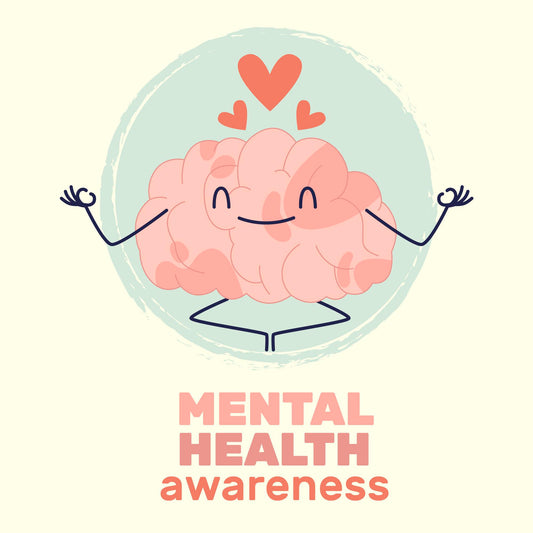10 Most Common Health Conditions in Men
Men can often be deemed as stronger because of their size or muscle mass compared to women's size. But health is the opposite. Men have a higher risk of developing chronic diseases in the early stage of age due to a variety of lifestyles, and biological and social factors. It can also include consuming alcoholic beverages, consuming unhealthy foods, and avoiding routine medical checks and screenings. When it comes to men's health, there are several common health conditions that they may face.
Here are 10 of the most common health conditions in men:
1. Heart Disease: Heart disease is a leading cause of death in men. It is important to maintain a healthy lifestyle by eating a balanced diet, exercising regularly, managing stress, and avoiding tobacco use to reduce the risk.
2. High Blood Pressure: High blood pressure, also known as hypertension, is a condition that can lead to various health complications, including heart disease. Regular check-ups and maintaining a healthy lifestyle can help manage blood pressure levels.
3. Prostate Cancer: Prostate cancer is the most common cancer among men. Regular screenings and early detection can significantly increase the chances of successful treatment.
4. Lung Cancer: Lung cancer is a major health concern, primarily linked to smoking. Quitting smoking and avoiding exposure to secondhand smoke are crucial in reducing the risk of developing lung cancer.
5. Diabetes: Diabetes is a chronic condition that affects how the body processes blood sugar. It is essential to maintain a healthy weight, exercise regularly, and have a balanced diet to manage and prevent diabetes.
6. Erectile Dysfunction: Erectile dysfunction (ED) is a common condition that affects men's ability to achieve or maintain an erection. It is often related to underlying health issues such as diabetes, high blood pressure, or heart disease. Seeking medical advice can help address the root cause and find appropriate treatment options.
7. Depression: Men can experience depression, but it is often underreported. It is important to prioritize mental health and seek support when needed. Talk therapy, medication, and lifestyle changes can help manage depression.
8. Obesity: Obesity is a growing health concern that increases the risk of various conditions, including heart disease, diabetes, and certain types of cancer. Maintaining a healthy weight through regular exercise and a balanced diet is crucial for overall well-being.
9. Stroke: Stroke occurs when blood flow to the brain is disrupted, leading to potentially severe consequences. Maintaining a healthy lifestyle, managing blood pressure, and maintaining a healthy weight can help reduce the risk of stroke.
10. Testicular Cancer: Testicular cancer is relatively rare but mostly affects younger men. Regular self-examinations and routine check-ups with a healthcare professional can aid in early detection and successful treatment.
It is important for men to prioritize their health by maintaining a healthy lifestyle, seeking regular check-ups, and addressing any concerns promptly. Consulting with healthcare professionals and following their recommendations can help prevent, manage, or treat these common health conditions effectively.
How Men Age
Throughout his adult life men undergo many alterations. Change in the human body affects men. Old men may need things more than younger men to stay healthy. In adolescents increasing testosterone levels tend to make a boy interested in sexual activity or to pursue risky activities. Societal expectations can make people unable to communicate about upcoming changes to their lives. Some think this may explain why women are more at risk for being injured unintentionally or in a wrongful death. In fact, As men age, it is important to focus on fitness and health to maintain overall well-being and quality of life.

Here are some key areas to consider:
1. Regular Exercise: Regular physical activity is crucial for maintaining fitness and health as men age. Engaging in a combination of cardiovascular exercises (such as walking, jogging, or cycling) and strength training exercises (such as weightlifting or bodyweight exercises) can help improve cardiovascular health, muscle strength, and bone density. Aim for at least 150 minutes of moderate-intensity aerobic activity or 75 minutes of vigorous-intensity aerobic activity each week, along with muscle-strengthening activities on two or more days.
2. Balanced Diet: Proper nutrition plays a significant role in maintaining good health. As men age, it becomes important to consume a balanced diet that includes a variety of fruits, vegetables, whole grains, lean proteins, and healthy fats. Limiting processed foods, sugary snacks, and excessive salt intake can help reduce the risk of chronic diseases such as heart disease, diabetes, and obesity.
3. Regular Check-ups: Regular medical check-ups are essential for early detection and prevention of health issues. Schedule routine visits with your healthcare provider to monitor blood pressure, cholesterol levels, and other vital health indicators. Additionally, discuss any concerns or symptoms you may be experiencing to ensure timely intervention and appropriate treatment.
4. Stress Management: Chronic stress can have adverse effects on both physical and mental health. Prioritizing self-care and finding a healthy work-life balance can also contribute to overall well-being.
5. Sleep Quality: Adequate sleep is vital for overall health and well-being. As men age, changes in sleep patterns may occur, making it important to prioritize good sleep hygiene. Aim for 7-9 hours of quality sleep per night by maintaining a regular sleep schedule, creating a comfortable sleep environment, and avoiding stimulants like caffeine and electronic devices before bed.
6. Social Connections: Maintaining strong social connections and engaging in meaningful relationships can have a positive impact on mental and emotional health. Stay connected with friends, family, and communities that share common interests. Participating in social activities, volunteering, or joining clubs or groups can help combat feelings of isolation and promote a sense of belonging.
Remember, it's never too late to start prioritizing fitness and health. Making gradual changes and adopting a healthier lifestyle can have long-term benefits and contribute to a fulfilling and active life as you age. Consult with healthcare professionals or fitness experts for personalized advice based on your specific needs and goals.
Men's Health Risks over Time
In the 20s and 30s men mature and cease taking risky behavior. However, it's more common for women to drink alcohol or smoke. In the twenties and 50s testosterone levels dropped. The body loses weight and increases its potential for weight loss. The risks are high for diabetes. In fact, 1 in 4 men die from heart attacks. Usually, the body doesn't stop producing testosterone as soon as men grow older. Men's health risks can increase over time if proper attention is not given to fitness and overall health. It is important for men to prioritize their well-being and take proactive steps to prevent or manage potential health issues.
Remember, consulting with healthcare professionals and following their guidance is essential for managing and mitigating these health risks. Additionally, leading a balanced lifestyle that includes regular physical activity, a nutritious diet, adequate sleep, and stress management is crucial for maintaining overall fitness and well-being.
Checkups and Screenings
In history, men never seek medical help. The average male doctor will only visit patients if the illness does not disappear immediately. Despite having no doctor visits during the last two months, 57 percent admitted to not seeing a physician. Unfortunately, doctors can diagnose and treat most common ailments with an early diagnosis. Depending on the severity of the disease, doctors are able to diagnose more severe conditions. Regular checkups and screenings are essential for maintaining good fitness and overall health.

Here are some key points to consider:
1. Annual Physical Exams: Schedule a comprehensive physical exam with your primary care physician or a healthcare professional. This will help identify any underlying health issues and allow for early intervention or prevention strategies.
2. Routine Blood Tests: Blood tests can detect various health markers such as cholesterol levels, blood sugar levels, and vitamin deficiencies. These tests can help identify potential risks and guide you towards making necessary lifestyle changes or seeking further medical advice.
3. Vaccinations: Stay up to date with vaccinations recommended by healthcare professionals. Vaccinations help protect against preventable diseases and play a crucial role in maintaining overall health and fitness.
4. Cancer Screenings: Depending on your age, gender, and family history, specific cancer screenings may be recommended. These screenings can include mammograms for breast cancer, colonoscopies for colorectal cancer, or Pap tests for cervical cancer. Regular screenings can help detect cancer at an early stage, increasing the chances of successful treatment.
5. Eye and Dental Exams: Don't overlook your eye and dental health. Regular eye exams can detect vision problems or early signs of eye diseases, while dental checkups help maintain oral health, preventing gum disease and tooth decay.
6. Mental Health Assessments: Mental well-being is crucial for overall health and fitness. Schedule regular appointments with a therapist or counselor to discuss any concerns or challenges you may be facing. This can help manage stress, anxiety, and other mental health issues effectively.
At what age do men start having health issues?
Risk to the health of men in life. In his 40's and 50's, the male hormones produced in the male body declined at the same rate. These men begin to lose and gain more weight. Their risk of cardiovascular disease and diabetes increases. The age at which men start experiencing health issues can vary depending on various factors including genetics, lifestyle choices, and overall health. While it is difficult to pinpoint an exact age, there are certain health concerns that tend to become more common as men age.
Starting from around the age of 40, men may start to experience changes in hormone levels, particularly a decline in testosterone. This can lead to symptoms such as decreased energy levels, reduced muscle mass, and changes in mood and sexual function.
In their 50s and 60s, men may be at a higher risk for developing chronic health conditions such as heart disease, high blood pressure, and diabetes. These conditions can be influenced by factors such as poor diet, lack of exercise, and smoking.
Prostate health is another important aspect of men's health, and issues such as an enlarged prostate or prostate cancer become more prevalent with age. Regular screenings and discussions with a healthcare provider are essential for maintaining prostate health.
It is important to note that while certain health issues may become more common with age, it is never too early to start prioritizing fitness and health. Engaging in regular physical activity, maintaining a balanced diet, managing stress, and getting regular check-ups can all contribute to better overall health and potentially help prevent or minimize the impact of age-related health issues.
It is recommended that men consult with their healthcare provider to discuss their individual health concerns and develop a personalized plan for maintaining their fitness and health as they age.
What is the #1 health threat to men?
Cardiovascular diseases - the leading health threats affecting health. 1 in 4 men suffer with heart disease. This causes the highest number of Americans to die. Some risk factors can vary from age to race or even from your family background. The number one health threat to men is cardiovascular disease. According to the Centers for Disease Control and Prevention (CDC), heart disease is the leading cause of death among men in the United States. It is responsible for approximately one in every four male deaths.
Cardiovascular disease encompasses a range of conditions that affect the heart and blood vessels, including coronary artery disease, heart attacks, strokes, and high blood pressure. Several factors contribute to the development of cardiovascular disease, including poor diet, sedentary lifestyle, smoking, excessive alcohol consumption, obesity, and family history of heart disease.
To mitigate the risk of cardiovascular disease, men should prioritize their overall health and adopt healthy habits. Here are some tips to promote heart health:
1. Regular Exercise: Engaging in physical activity for at least 150 minutes per week, or 30 minutes a day for five days, can significantly reduce the risk of heart disease. Incorporate aerobic exercises like walking, jogging, cycling, or swimming into your routine.
2. Healthy Diet: Maintain a well-balanced diet consisting of fruits, vegetables, whole grains, lean proteins, and limited saturated fats, trans fats, cholesterol, sodium, and added sugars. Opt for nutrient-dense foods that support heart health, such as fish, nuts, seeds, and olive oil.
3. Manage Stress: Chronic stress can contribute to the development of cardiovascular disease. Adopt stress management techniques like meditation, deep breathing exercises, yoga, or engaging in hobbies and activities that help you relax.
4. Avoid Smoking: Smoking is a significant risk factor for heart disease. Quitting smoking or avoiding exposure to secondhand smoke can greatly improve heart health.
5. Limit Alcohol Consumption: Excessive alcohol consumption can raise blood pressure and contribute to heart disease.
6. Regular Check-Ups: Schedule regular visits with your healthcare provider to monitor your blood pressure, cholesterol levels, and overall cardiovascular health. Early detection and management of risk factors can significantly reduce the likelihood of developing heart disease.
Remember, prevention and proactive health management are crucial in reducing the risk of cardiovascular disease, the number one health threat to men. By adopting a healthy lifestyle and seeking regular medical care, men can take control of their heart health and lead a long and fulfilling life.








